Gruff
Developer: Studio Woe
Format: Card Game
Number of Players: 2-4
Price: $35
January 2016
One of the best things about Gruff is the way you sound while playing it. It might be because suddenly “Damn, my goat isn’t mean enough, and bounces off your goat’s fat” is a completely sensible sentence to say outloud. You will be laughing at your opponent as one of you pantomimes a situation that just played out on the table in front of you: your tentacled goat being bounced back from a failed attack, a horned beast flying overhead to headbutt the opposing sherpard, or, perhaps, a loud explosion as your motorcycle/goat hybrid animal is detonated by dark necromantic magic.
Gruff is the combat of a collectible card game, distilled down to an intense, quickly escalating death match. At the same time, it also manages to be infused with its own charm and style, and is totally unreliant on the need for random boosters. I was able to talk with one of the creators, Brent, while at PAX East this year, and it was hard not to see the TLC put into creating this game.
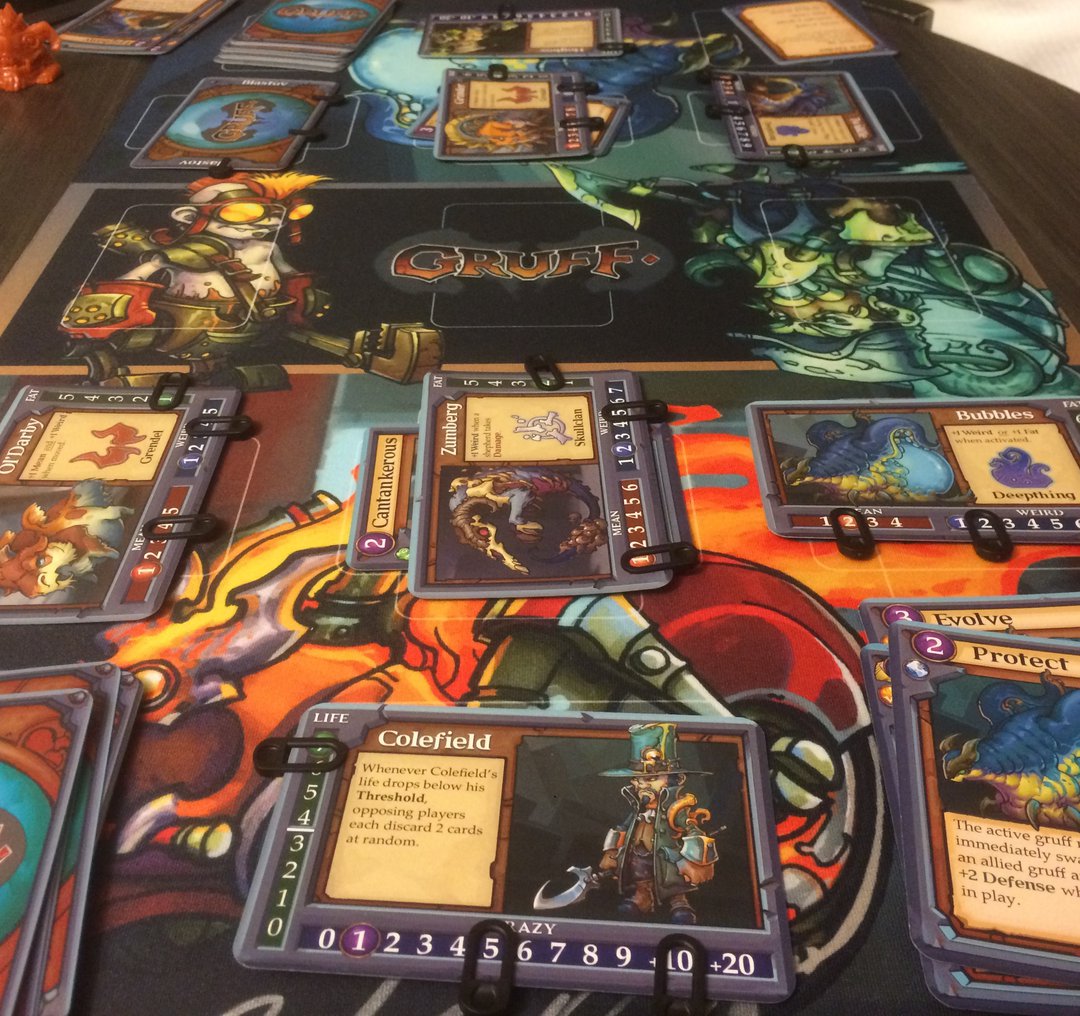
“It’s been in development for four years now”, he admitted, with a sense of pride. “We wanted to make something new and special, which was our vision brought to life. We had worked on big teams before, but Gruff was our chance to make something unique.”
Unique is a good word for it. Brent and Virginia Critchfield are the husband and wife team behind Studio Woe, and they had previous worked on games like League of Legends and Darksiders.
As someone that likes both video games and tabletop, it’s interesting how often now developers and creators are jumping between these two different genres. They often bring interesting spins on old conventions, and can revitalize concepts that have long since seemed played out. Gruff is a great example of how some game design mechanics twisted on their head can turn into great gameplay.
How You Prepare (For Bizarre Farmland Massacres)
Gruff starts with your horde of monsters already on the table. Unlike Magic: The Gathering and most other card games, there is no need to build up mana to get the fight started. If you wanted to, you could open up the first turn launching Bubbles the goat into the fray, frothing at the mouth and ready to kill.
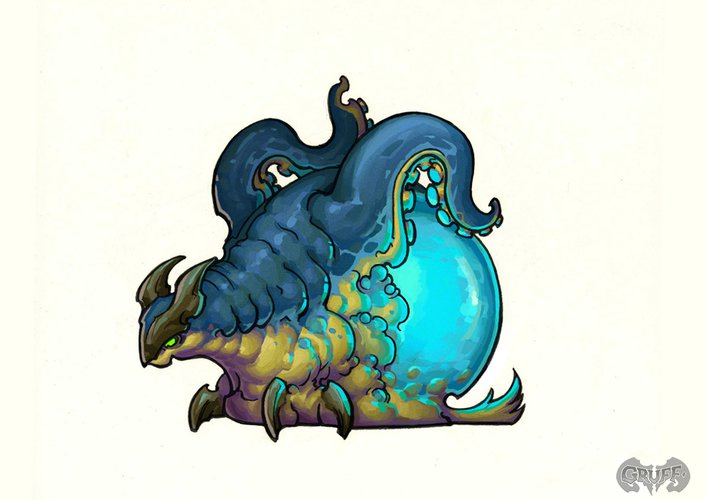
Awww, isn't she adorable?
Goats have three key statistics: Mean, Fat, and Weird. Mean and Fat make some immediate sense: one is their ability to attack, and the other is their ability to defend against others. Weird is how, well, bizarre your goat is, and thus, how much Crazy he generates to your shepherd when you activate that goat for your turn. If you want to know the statistics for your shepherd, they are Life and Crazy. One is your obvious health, and Crazy is in actuality, your mana pool. Crazy is how your use the cards in your hand to cause effects on the battlefield; in effect, Gruff has taken out the need for summoning your monsters, and instead makes your card hand just the tool chest of spells and tricks.
You get to change your deck of cards every time you play Gruff, in a way that’s both simple and ingenious. When you first set up to play, you choose your shepherd (one out of 7 in the base game) and then three goats to accompany him (3 out of 15). Each goat and shepherd has a special characteristic that’s unique to them, and so making choices based on your style or strategy helps here.
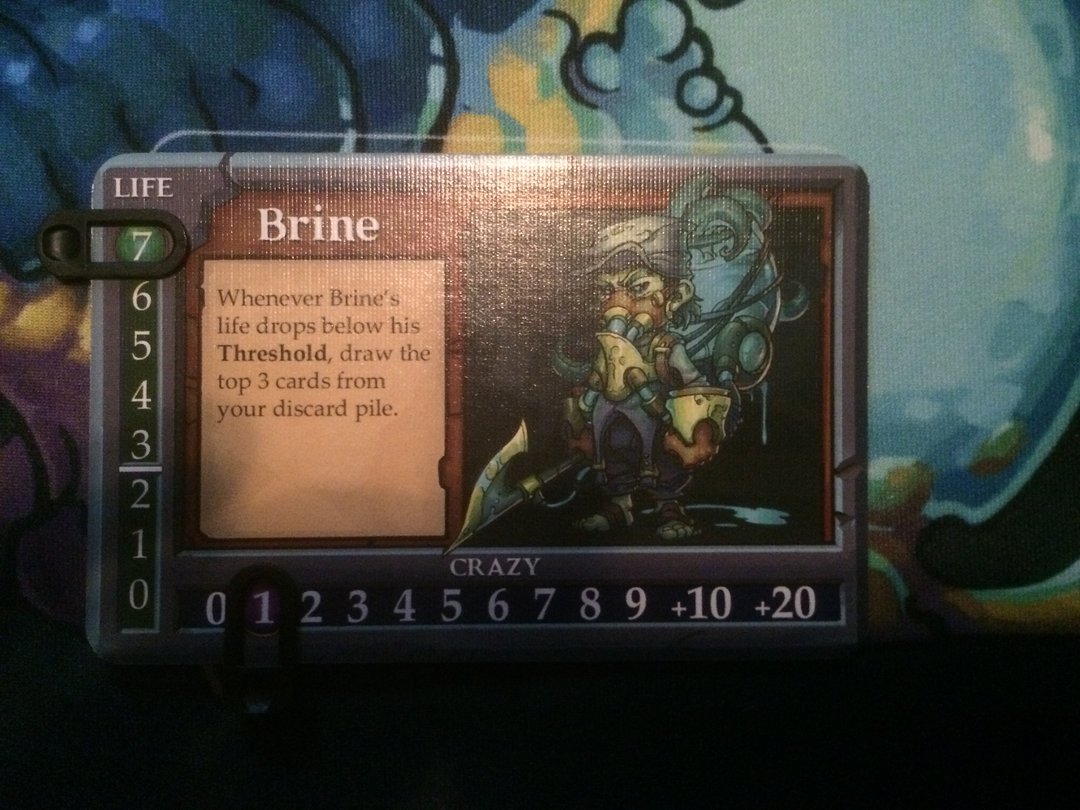
More variation comes with the set of 15 cards that are unique to each goat. These are fun just to look through, because different goats have different styles about them. The Grendel goats, the ones that are the most recognizable AS goats, have a set of well rounded abilities meant to improve their stats or help them move around the board. In comparison, the Deepthing goats have a C’thulian madness sense about them, and thus have a lot of ways to play with cards and generating crazy faster. It goes even further with the skullclan goats, which are goats that have been tampered with using necromancy. Their cards play with life totals and outright murder, letting you sacrifice the goat in order to kill another one on the field, or perhaps injuring your shepherd in a risky attempt to gain an advantage at the right time.
Out of these fifteen cards, you choose eight that you like, and shuffle them together. You do this for each of your three goats, and that’s how you have your personalized deck of tricks to confuse your opponent with. It’s such an effective way to personalize each game that it makes me almost mad.
How You Play (And Try To Go Crazy)
Each turn begins with you choosing which goat to activate: you turn it sideways to exhaust it, and add the goat’s weird value to your shepherd’s crazy score. You then get to play any amount cards from your hand that total up to your current crazy score for that turn, and then choose one of four actions to finish up that round. You can resurrect a fallen goat (from previous mishaps in the game), swap places of your active goat with a neighboring goat, or ‘grow’ them, increasing on of their base stats by one for future rounds. Of course, you can just throw caution to the wind, and attack as well.
As I said before, you can start the game by launching a goat into battle on turn one, and in some games, this is a great strategy. You win once your opponent’s shepherd hits zero health; since shepherds have less than ten health, an early hit could go a long way. However, attacking with a goat sends it out into the middle row, locking it in place until it is your turn again. It gives your opponent a round to prepare a defense, so committing to an attack is something that should be done strategically.
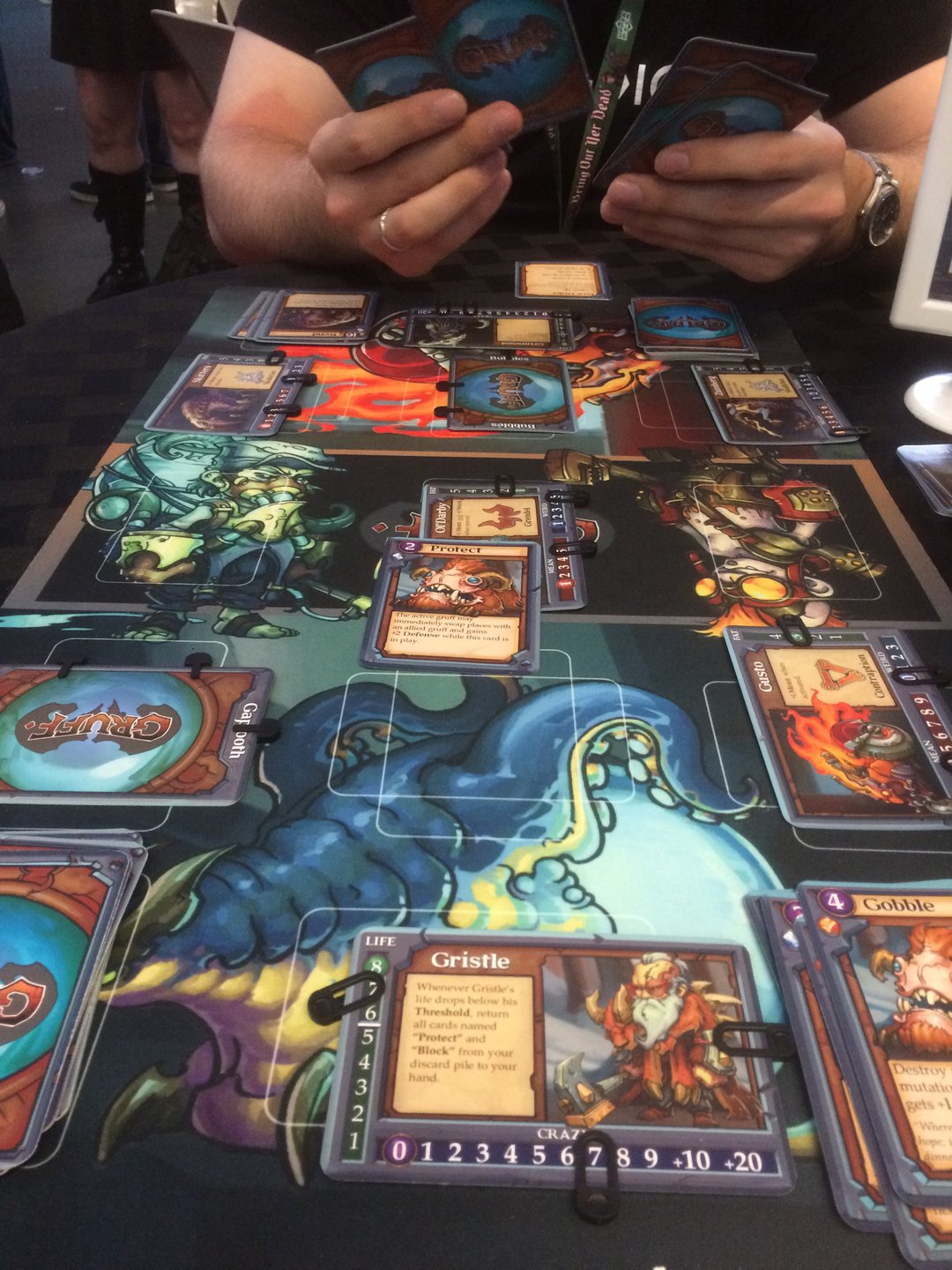
The game has a great, focused feel. Three monsters each, three lanes of attack and defense.
If your goat has less Mean than your opponent goat’s Fat, then you literally bounce back to your side of the board, the attack unsuccessful. If your goat’s Mean is equal to a goat’s Fat, then that goat dies. If your goat has more Mean than your opponent’s Fat, then any extra damage translates onto the enemy shepherd; yes, everyone has goats, so it makes sense they all have a trample mechanic, ala Magic: The Gathering. Once your opponent’s shepherd is at zero health, you win! …and are now stuck with a group of maddeningly grotesque goats that you have mutated out of control. Hooray?
The Game In Progress (The Madness…The Horror!)
This game gets stupid-silly, very quickly. Let’s take my favorite goat, Ol’ Darby. He is the most normal looking goat in the game, and yet one of his most expensive cards makes him fly. He has only average statistics, but he’s adorably brutal because whenever you move him, his stats improve. Take a lot of cards (which he has in his set) that push him around, and you can grow his abilities very quickly.
Compare that to Zumberg, a not-as-cute goat that is back from the dead…repeatedly. He’s wonderful because you can just outright kill him with his cards for special effects, like killing another goat of your choice on the board. This can be a great way to surprise an opponent who thought he had a good defense going, going for a strong strike early. You can also kill him to give your shepherd back some health when things get desperate. Don’t worry though: he has cards you can choose to resurrect him back without wasting an action, or simply resurrect all goats on the board for cheap.
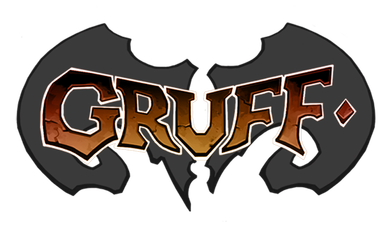
Combat itself is, like I said before, a wonderfully simplified experience in comparison to other card games. You can start fighting right out the gate rather than waiting to summon monsters to begin with. Deciding who is blocking for you is constricted – in a good way – by the three-lanes of fighting that are on the board. It’s made into a crucial choice every round: go on the attack yourself, or reposition your better-blocking goat to take the hit against an attacker? Since there is a round between when you choose to attack and when the damage goes through, it gives both players time to adapt and prepare, rather than leaving it to fleeting ‘scoring windows’ or ‘instants’.
There is a counter move for everything. My flying Ol’ Darby trick let me soar overhead for a victory in one game, but in the next, my opponent was able to swap them out of combat at the last minute, making me waste that expensive trick. A weak goat like Bubbles might seem terrible in outright fighting, but their ability to give you Crazy and get your opponent to discard their cards can be worth the trade off. There’s a wonderfully fun mutation card by the goat Gobs where he can make one goat unable to deal damage, but also absorb all damage being done to them. You can use it on your own goat to create a perfect defender, OR you can use it to suddenly render your opponent’s best attacker useless.
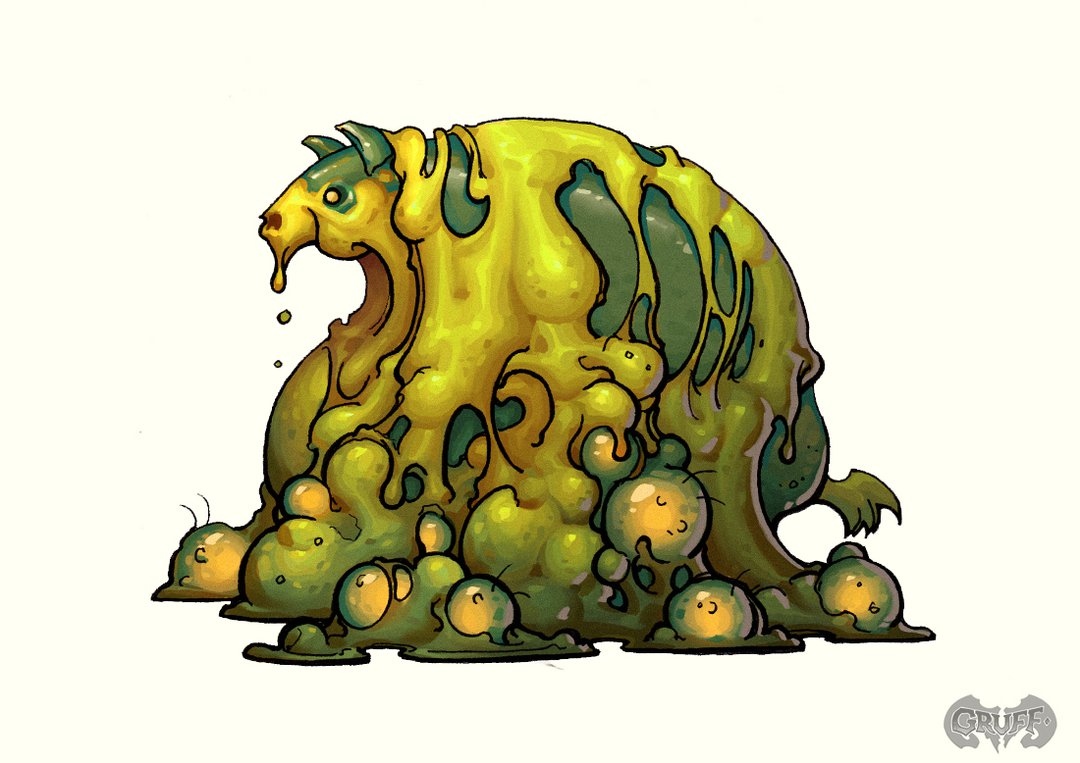
This is Gobs - I fell in love with Gruff partially because it has such a great unified art style
Naturally, a lot of the tricks available to you are going to be reliant on which goats and which cards you choose each game. Building your deck can be just as important as playing the game itself. This is probably where you run into the one issue I found while playing Gruff with friends: some choices can sink you before you even begin. In one of my test games, I choose two weird-building goats and Ol’ Darby to see what I could do if I had unlimited amounts of Crazy. I found myself at a place where I had plenty of tricks and ability to defend myself, but my opponent easily just built up enough fat that I just couldn’t get through. I had to wait for them to murder me as my bleating goats kept ineffectually bouncing off theirs. There have been one or two games where either side just couldn’t quite land a killing blow, causing the game to drag out longer than expected.
Adding a deck-building element filled with choices is going to cause this; sometimes, a decision made early can sink you much later on. In my experience, this did lead to an occasional frustrating match, but as I played more games, it became easier for me to avoid this issue. You get better at building the teams you like, and knowing how to hit where it hurts. It’s just something to keep in mind if you are playing the game with other new players: one game might end up being a steamrolling event, but in the next match, you can learn from your mistakes and come right back.
Is Gruff Worth Your Money?
Yes. Yes, this game is worth your money. In fact, I would go so far as to say that it can be one of the best bangs for your buck in card games. For 35 dollars, you get not just one ‘deck’, but many. With 7 shepherds, 15 goats, and 225 ability cards to make a deck out of, that’s a lot of variety at your fingertips. It’s also enough where you can play just out of one box for all players, unlike traditional deck making games like Netrunner.
I’ve had consistent fun with the game, and found that others are interested in learning or trying Gruff based on its zany art and style alone. It has enough crunch and strategy for real intense tacticians like Dana, who enjoys trying to build a perfect deck. I’ve also been able to introduce it to people who typically don’t play card games like this, and by the end of the match, they are pulling off tricks to cause me to suddenly be nervous about my shepherd’s health. Some games can be dragged out if both sides play a defensive game, but the mechanics are fun enough that I wasn’t put off by this.
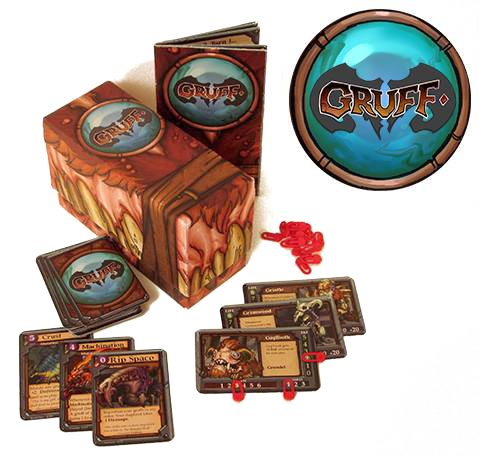
Brent and Virginia have made something special here, and I really enjoy how Gruff throws you into combat that continually grows crazier by its very nature. The terminology grabs your eye and gives it a flavorful feel, and the creators’ previous experience in video games lends itself a feeling of polish and straightforwardness that many card games like this lack.
So what are you waiting for? It’s not too late to try and be a crazed leader-of-goats. In fact, Studio Woe is hosting a kickstarter right now for its first expansion to add even more options to your game; some of the packages in it are a great way to grab everything you need to start playing.
Go on. Get a little weird. Get fatter and meaner, and go have fun proving you’re the meanest shepherd in town.